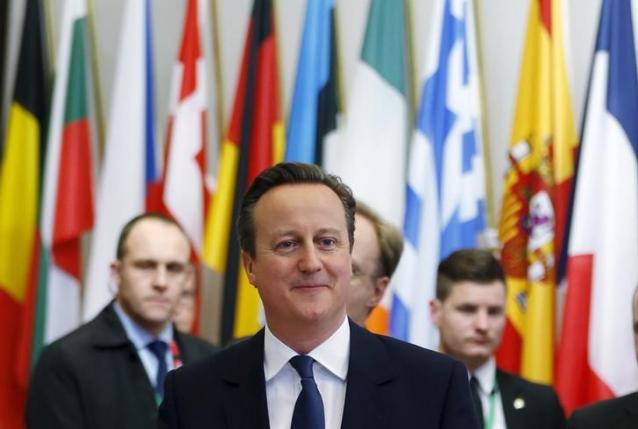
Britain’s Prime Minister David Cameron leaves a European Union leaders summit in Brussels, Belgium, February 19, 2016. REUTERS/Francois Lenoir
British Prime Minister David Cameron on Saturday has called for a referendum on Britain’s membership of the European Union to take place on 23 June, underpinning the fact that this step could have far-reaching consequences for Britain’s unison and for the viability of the world’s biggest trading bloc.
The announcement came after holding a rare Saturday Cabinet meeting and winning its agreement to recommend that Britain remain part of the EU rather than strike out on its own.
Yet, regardless of that support, some Cabinet figures will support the “leave” campaign that wants Britain to carve its own path outside of the EU bureaucracy in Brussels.
Speaking from outside Downing Street, the prime minister declared he had secured a good deal with Brussels to secure UK’s position asserting that it would be “safer and stronger” if it remained in the 28-nation bloc.
“Britain will be safer, stronger and better off by remaining in a reformed European Union,” Cameron, 49, said outside his Number 10 Downing Street residence in London, kicking off a four-month referendum campaign.
Cameron said if Britons decided to remain in the EU, he would seek continued reforms to address their concerns about job losses and benefit payments to EU migrants seeking work in Britain.
Forty-three years after Britain joined the EU’s predecessor, Cameron sealed a deal from 27 other leaders to give it what he said was a special status before presenting the new settlement to senior ministers in London.
In the first British cabinet meeting on a Saturday since the 1982 Falklands War, Cameron said he had won the blessing of his colleagues to recommend to voters that Britain stay in the bloc it joined in 1973.
“Leaving Europe would threaten our economic and our national security,” Cameron said, adding that he would propose to parliament that the referendum be held on Thursday June 23, in the middle of the Glastonbury music festival and the Euro 2016 soccer championship.
The deal Cameron agreed upon Friday with 27 other EU leaders protects Britain from taking part in an “ever closer union” with European nations and makes clear that Britain will not adopt the euro currency shared by 19 EU nations. Cameron says it also safeguards British interests and curbs British welfare payments to migrants from other EU nations.
Britain has been divided over its European destiny since France and West Germany pursued closer unity to prevent a repeat of the destruction wrought by World War Two and, though Britain eventually joined the club, it remained a reluctant member outside the core euro zone.
Both U.S. President Barack Obama and Chinese President Xi Jinping have commended Britain to stay, but British voters – and Cameron’s ruling Conservative Party – are split on membership.
Polls suggest about a fifth of voters are undecided though betting odds have moved further in favor of Britain remaining a member since Cameron’s summit deal in Brussels.
A British exit from the EU would rock the Union – already struck by differences over migration and the future of the euro zone – by ripping away its second-largest economy, one of its top two military powers and by far its richest financial center.
